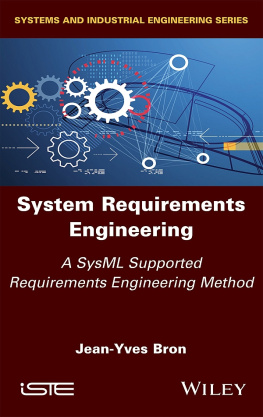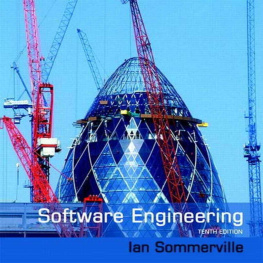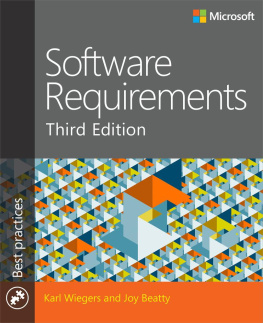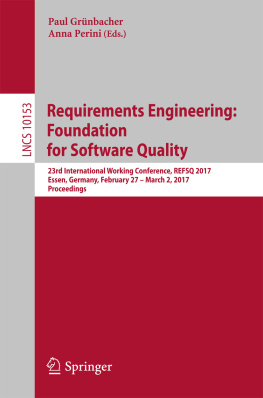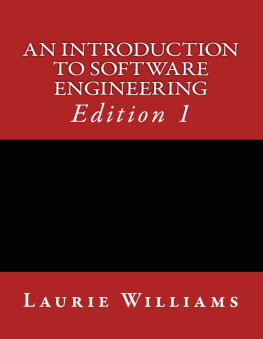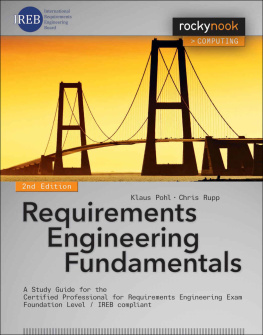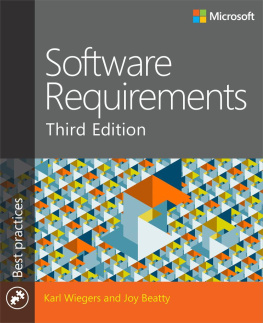References
- [AFI 12a] AFIS, Dcouvrir et comprendre lingnierie systme, Cpadus ditions, Toulouse, 2012.
- [AFI 12b] AFIS, Guide Bonnes pratiques en ingnierie des exigences, Cpadus ditions, Toulouse, 2012.
- [AFI 98] AFIS, Association Franaise dIngnierie Systme, available at: www.afis.fr, since 1998.
- [ARC 19] Clarity, ARCADIA, a model-based engineering method, available at: www.clarity-se.org.
- [CAM 20] Cameo Systems Modeler, Dassault Systmes No Magic, available at: www.nomagic.com, 2020.
- [CAP 19] Capella, Capella, an open source solution for Arcadia method, available at: www.polarsys.org/capella.
- [CAS 17] CASSE O., SysML in Action with Cameo Systems Modeler, ISTE Ltd, London and Elsevier, Oxford, 2017.
- [FAI 12] FAISANDIER A., Engineering and Architecting Multidisciplinary Systems Volume 2 Systems Opportunities and Requirements, SinergyCom, Belberaud, 2012.
- [FRI 08] FRIEDENTHAL S., MOORE A., STEINER R., A Practical Guide to SysML The Systems Modeling Language, Morgan Kaufmann, Waltham (MA), 2008.
- [HAR 14] HARMONY, IBM Rational Harmony Deskbook Rel 4.1., available at: www.ibm.com, 2014.
- [HOL 12] HOLT J., PERRY S., BROWNSWORD M., Model-Based Requirements Engineering, Institution of Engineering and Technology, London, 2012.
- [IEE 11] IEEE, IEEE 1490 IEEE Guide--Adoption of the Project Management Institute (PMI(R)) Standard A Guide to the Project Management Body of Knowledge (PMBOK(R) Guide) Fourth Edition, 2011.
- [IEE 14] IEEE, IEEE 730 IEEE Standard for Software Quality Assurance Processes, 2014.
- [INC 90] INCOSE, International Council on Systems Engineering available at: www.incose.org, since 1990.
- [IRE 06] IREB, International Requirements Engineering Board available at: www.ireb.org, since 2006.
- [IRE 15] IREB, Requirements Engineering Fundamentals, Rocky Nook Inc., San Rafael (CA) 2015.
- [ISO 07] ISO/IEC, ISO 14143 Information technology Software measurement Functional size measurement Part 1: Definition of concepts, 2007.
- [ISO 15a] ISO/IEC/IEEE, ISO 15288 Systems and software engineering System life cycle processes, 2015.
- [ISO 15b] NF/EN/ISO, ISO 9000 Quality management systems Fundamentals and vocabulary, 2015.
- [ISO 17a] ISO/IEC, ISO 19514 Information technology Object management group systems modeling language (OMG SysML), 2017.
- [ISO 17b] ISO/IEC/IEEE, ISO 24765 Systems and software engineering Vocabulary, 2017.
- [ISO 18a] ISO/IEC, ISO 29110 Systems and software engineering Lifecycle profiles for Very Small Entities (VSEs), 2011-2018.
- [ISO 18b] ISO/IEC/IEEE, ISO 29148 Systems and software engineering Life cycle processes Requirements engineering, 2018.
- [ISO 19] ISO/IEC, ISO 24748 Systems and software engineering Life cycle management, 2011-2019.
- [KRO 17] KROB D., CESAM: CESames Systems Architecting Method A Pocket Guide, CESAMES, Paris, 2017.
- [MAR 94] MARTIN J.N., The PMTE Paradigm: Exploring the Relationship Between Systems Engineering Process and Tools, INCOSE International Symposium, San Jos (CA), August 1994.
- [POL 19] Polarion RM, Polarion REQUIREMENTS, https://polarion.plm.automation.siemens.com/products/polarion-requirements, 2019.
- [RHA 19] RHAPSODY, IBM Rational Rhapsody Architect for Systems Engineers, available at: www.ibm.com, 2019.
- [ROB 13] ROBERTSON S., ROBERTSON J., Mastering the requirements process Third edition, Addison-Wesley, Boston, 2013.
- [ROB 18] AFIS, Concours RobAFIS 2018, available at: www.robafis.fr, 2018.
- [ROQ 17] ROQUES P., Systems Architecture Modeling with the Arcadia Method A Practical Guide to Capella, ISTE Ltd, London and Elsevier, Oxford, 2017.
- [SEB 18] SEBoK, Guide to the Systems Engineering Body of Knowledge www.sebokwiki.org, Version 1.9, 12 October 2018.
- [SYS 04] SysML, OMG Systems Modeling Language www.omgsysml.org, since 2004.
- [VOI 17] VOIRIN J.-L., Model-based System and Architecture Engineering with the Arcadia Method, ISTE Ltd, London and Elsevier, Oxford, 2017.
- [VOL 95] VOLERE, Volere Requirements Resources volere.co.uk, since 1995.
- [WIK 01] WIKIPEDIA, Lencyclopdie libre fr.wikipedia.org, since 2001.
Index
A, B, C
- Arcadia,
- architectural concept,
- boundary,
- CESAM,
- context,
D, E, F
- diagram,
- activity,
- block definition,
- use case,
- document,
- elicit,
- elucidate,
- external system,
- formalization,
- functional requirement,
- functionality,
H, I, L
- Harmony SE,
- identifier,
- interested party,
- ISO
- life cycle,
M, N, O
- metamodel,
- method,
- mission,
- model,
- modeling,
- needs,
- negotiate,
- non-functional requirement,
- operational concept,
P, Q, R
- package,
- planning,
- Polarion,
- problem,
- processes,
- project,
- purpose,
- quality,
- requirement(s),
- diagram,
- engineering,
- management,
- rhapsody,
S, T, V, W
- scenario,
- semantics,
- sequence diagram,
- SMART,
- solution space,
- stakeholder,
- state machine diagram,
- stereotype,
- syntax,
- SysML,
- system(s),
- concept,
- engineering,
- for doing,
- framework,
- requirements,
- thinking,
- to be done,
- task,
- template,
- textual description,
- tool,
- traceability,
- validation,
- verification,
- workflow(s),

2019
ANDR Jean-Claude
Industry 4.0: Paradoxes and Conflicts
BENSALAH Mounir, ELOUADI Abdelmajid, MHARZI Hassan
Railway Information Modeling RIM: The Track to Rail Modernization
BLUA Philippe, YALAOU Farouk, AMODEO Lionel, DE BLOCK Michal, LAPLANCHE David
Hospital Logistics and e-Management: Digital Transition and Revolution
BRIFFAUT Jean-Pierre
From Complexity in the Natural Sciences to Complexity in Operations Management Systems
(Systems of Systems Complexity Set Volume 1)
BUDINGER Marc, HAZYUK Ion, COC Clment
Multi-Physics Modeling of Technological Systems
FLAUS Jean-Marie
Cybersecurity of Industrial Systems
JAULIN Luc
Mobile Robotics Second Edition Revised and Updated
KUMAR Kaushik, DAVIM Paulo J.
Optimization for Engineering Problems
TRIGEASSOU Jean-Claude, MAAMRI Nezha
Analysis, Modeling and Stability of Fractional Order Differential Systems 1:
The Infinite State Approach
Analysis, Modeling and Stability of Fractional Order Differential Systems 2:
The Infinite State Approach
VANDERHAEGEN Frdric, MAAOUI Choubeila, SALLAK Mohamed,
BERDJAG Denis
Automation Challenges of Socio-technical Systems
2018
BERRAH Lamia, CLIVILL Vincent, FOULLOY Laurent
Industrial Objectives and Industrial Performance: Concepts and Fuzzy Handling
GONZALEZ-FELIU Jesus
Sustainable Urban Logistics: Planning and Evaluation

